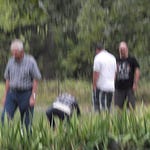Bees gather by the hundreds in hives. Geese fly south in flocks. Cattle travel in large herds. And flowers are more beautiful when they are blooming with others. Nature often demonstrates a we, not a me, approach to life. This is not life in the singular, this is what I call life in plural.
Note about the image: I picked this picture because I was struck by how much prettier flowers are when they are bunches of them growing together. This is life in plural.
My Mysterious Mind
An old Proverb, possibly from Africa, states: “If you want to go fast, go alone; If you want to go far, go together.” I love the spirit of this, but I’m not sure I am in total agreement with it. The statement puts speed against distance in how to approach life. After all, “many hands make light work,” indicating the efficiency of working with others, not just the sum of what is accomplished. Is life a choice between sprinting and running a marathon? And is “going it alone” the only way to achieve fast results, and collaboration the only way to achieve endurance?
Cockroaches run faster in groups than they do alone. A single cockroach is much slower than a bunch of them. Not to equate humans with roaches, but this now “classic” study pointed to a “social facilitation effect” of group work. If you want to go fast, you might want to go with others. Competition, such as for hiding spaces if you are a cockroach, appears to be a catalyst for speed. Not known for their collaboration, cockroach research is not helpful as a foundation for humans doing group work.
Which recalls the “divide and conquer” method of getting something done. This motto clearly points to a group approach to quickly getting something done. It makes sense. One task divided among several people makes less work for each person and can reach completion more quickly. I first heard the proverb about going alone to go fast when at a faculty meeting. In that context, laden with the inertia of university committees, I can definitely see times when getting something done quickly would mean accomplishing the work by oneself.
As for “going far,” working with others can bring encouragement and endurance for the long haul. When one is weary, another can carry their load for a while. If discouragement comes to one, the others can serve as cheerleaders.
Life in plural is about living as “we” instead of living as “me.” My marriage becomes our marriage. My country changes to our country. My workplace is replaced with our workplace. My community shifts to our community. As ancestors of the independent types who immigrated to this country, I suspect our genetic predisposition is a me, rather than a we, focus for living.
Unlike the proverb, perhaps we can go faster and farther together than each can go alone.
Message of Mystery Acres
The forest is a beautiful demonstration of working together. It is, after all, an ecosystem. Life in plural is a system of togetherness. It has been said that “no man is an island,” but even an island is a system, and a man who tries to be an island, will find he soon runs out of energy.
I am not a botanist, or an ecologist, or a biologist. But, like the forest, each of these “ologies” include a we-ness of individual components forming a complex whole. Land, plants, animals, and atmosphere are interconnected, their survival mutually dependent. Collective life is a composite of individual life that separately would not survive. Life for the forest is life in plural.
Perhaps it’s that sense of togetherness that instantly enriches me upon arrival in the forest. No longer driving like I own the road, I arrive at a place where me and mine don’t even make sense. The forest is about our and ours. People talk about “communing with nature.” I wonder if what they need is a sense of “us” provided by life in plural, a life demonstrated so naturally by nature.
The message of Mystery Acres calls to us to live as we and not as me. Communing with nature is entering community with the land, plants, animals, and atmosphere who only live life in plural. The residents of the forest endure together. They’ve endured together for centuries. I don’t know if that is going “far” and going “fast,” but it certainly is a compelling model for life to ponder.
Ancient Mystery’s Voice
“Our Father… give us our daily bread…. forgive us as we forgive others … lead us… deliver us.” (See the Lord’s Prayer)
There are many ancient texts about life in plural. One of the most-recited is what is known by Christians as “The Lord’s Prayer.” When asked by His disciples about how to pray, Jesus gave a prayer to them. The pronouns He used were plural. He started the prayer with “our Father,” not “My Father.” The prayer included a request for “our daily bread,” not “my daily bread.”
He included an emphasis on forgiveness, which is often thought of as an individual’s problem. But Jesus’s prayer for His followers used the phrase “forgive us as we forgive others.” Forgiveness, a foundation for peace-filled living, is part of life in plural.
As for daily guidance, life in plural is, again, the focus, with the phrases “lead us” and “deliver us.” As we pray for direction, we are asking to be led away from mistakes and dangerous places. This implies traveling together with others, not on a solo journey through life.
As an independent-minded American, I’m inclined to change the prayer to “my Father, my daily bread, forgive me as I forgive others, lead me and deliver me.” That’s not the “life in plural” prayer given by Jesus. The words of Ancient Mystery’s Voice direct a we, not a me, approach to prayer and to life.
Living in Mystery
What does it mean to live in plural rather than singular? First, it means paying attention to the pronouns we use for various aspects of life. How often is our conversation littered with “I,” or “me,” or “my?” Where could the same comments be shifted to “us,” or “we,” or “our?” The words we use reflect the condition of our hearts. An awareness of the pronouns used can uncover hearts locked into a singular style of thinking. In an era where many of us long deeply for community, a simple way to draw closer together starts with the way we define possessions and experiences.
Next, life in plural requires an attitude of sacrifice. The needs and wants of self may need to be surrendered for the well-being of community. Collectivist cultures do this better than Individualist ones. I’m not suggesting each of us become mindless parts of a grand collective. What I am recommending is that life in plural, and the benefits of community, require a willingness to set aside one’s own demands at times. What we need might not align with what I want. That’s a tough one for some of us.
As an old mom to young parents, I confess to referring to the offspring my husband and I produced as “my children.” He has often corrected me by saying “our children.” My pronoun choice reveals a selfish approach to parenting. I use the pronoun “my” because I wasn’t working together with my husband in my mind. That attitude was showing up not only in my words but also in my actions. It doesn’t matter if we needed to go “faster alone” because parenting is a marathon, not a sprint. The endurance test of parenting is better accomplished through a life in plural approach. Remember, your children are not just your children. Sharing the ownership of children is part of sharing the burdens of parenting. The rewards are also shared, which is more fun than celebrating alone.
There is a famous song with the phrase “one is the loneliest number.” Life in singular is lonely. Solitude is wonderful and necessary. Solo existence is not either. It is good to be alone sometimes, but it isn’t good to be alone. Life in plural means learning to share, learning to think in plural pronouns, and being willing to surrender personal wants for collective benefit. In the battle of we vs. me, it’s better for all of us, and each of us, if we is victorious over me. Live your life, which is just your life and no one else’s, by choosing to live that life in plural with others.
Connecting with Mystery
Dear Lord of All Mystery, I confess to being focused on “me” and “mine” more than “we” and “ours.” Help me to recognize when the selfish condition of my heart shows up in the words I use and the actions which follow. Thank You for giving me a prayer to practice shifting my singular focus to living a life in plural. Amen.
Notes from Dr. Mac
If you want to do your own investigation of any of the scriptures I use, I suggest you go to Bible Gateway. This free online version of the Bible allows a search of words or phrases. Various translations can be selected from the old-time language of the King James version to the more modernized language of The Message. The full text of the Lord’s Prayer and the context in which it was given can be found in the sixth book of Matthew, starting at verse 5.
You can find previous posts of my work at my ARCHIVE and organized compilations in the My Books section. You can also find Mystery’s Voice on Spotify.
I want to know what you’re thinking! You can email me at: Dear Dr. Mac or leave/send a message (see below). I love hearing from you!














Share this post